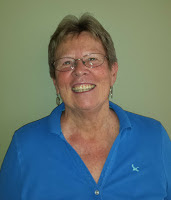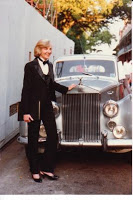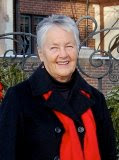Looking back on it, I had rather nice hair when I was young, in a typically English way; golden-brown with a few coppery highlights. But I didn’t appreciate it one whit at the time. My mother created two braids for me every morning until she began school teaching again, at which time she announced it had become my responsibility. I was somewhere in the early grades at Elementary School so I guess I was six, maybe seven. Braids were the only thing I knew, so I continued them. Unfortunately, my pudgy little arms were not sufficiently flexible, not were my young fingers skilled enough, to create the braids at the back of my head. Instead, I pulled half of the loose hair forward over each shoulder and braided it from the front, resulting in braids which refused to hang down my back. No matter how often I shoved them back, they persistently sprang forward to flop down my chest. They were almost waist-length and seemed constantly to inhibit the important things in life such as lessons or games. The morning one of them dunked itself in my toast and honey was the last straw.
So I cut them off.
Inexpertly.
Unevenly.
With old, blunt, rusty, scissors.
The second I had done it, I panicked.
What had I done?
Why oh why had I done it?
I looked about me as I scooped my severed braids up from where they languished on the kitchen floor. Even as I gazed hopefully about for somewhere to hide them, as young as I was, an inescapable logic told me that there was absolutely no possibility that no-one would notice my lack of them.
My mother came into the kitchen. She stared at me, then at the lifeless braids hanging from my little fists. She remained silent, uttering not even a grunt or a sigh. She propelled me into the living room, gently took the braids from me and tossed them casually onto the open fire. I stared, in equal silence, as the hair, my hair, curled and crackled and sparked, turned rapidly black, and gave off a sickening odor. And it was gone.
I risked a sideways peak at my mother, who resumed her place in the old armchair: picked up her book, sipped her tea. I squinted at Dad, in the other armchair, reading a car magazine and sipping his tea. He was on an afternoon tea-break from chopping wood. The only sound in the room was the ticking of the grandfather clock standing on duty in its corner and the contented purr of the cat re-settling herself on Mum’s knee. I stood on the hearth, shuffling my feet, waiting for whatever was going to happen, to happen.
Dad put his magazine and tea cup down on the little table beside his chair, looked up at me and gave a solemn wink.
‘Get your coat on,’ was all he said.
We walked, my hand in his, across the fields through a cold drizzle, to the neighboring farm where we immediately saw and heard the farmer, in his barn, attempting some work on the tractor engine. He was addressing it with a string of very bad words, which he swallowed back down his throat the moment he saw me.
‘ ‘Ow do’ he greeted us genially, adding to my dad, as he jerked his head towards the engine, ‘Bloody lucky you’re ‘ere.’
I never heard either of my parents even say bloody, but it was inoffensive enough to Mr. Llewellyn that he let it slip right through his filtering system.
‘Ay,’ my dad replied, ‘Lucky you’re ‘ere an’ all.’
By way of explanation he pirouetted me around.
‘Bloody ‘ell!’ was the response as Mr. Llewellyn grinned at me, a very rare event, displaying many gaps in his jagged brown teeth. He shoved his greasy flat cap to the back of his head.
‘Dog been chewing at yer ‘air?’
He waved me to a filthy old bench outside the barn and reached for an equally filthy leather bag up on a shelf.
For the first time since I’d picked up those scissors, I relaxed. This was familiar territory. I knew what to expect. More or less on a monthly basis my dad came to the farm to have what little hair he had left cut by Mr. Llewellyn with his sheep shears. Money never changed hands. Dad was terrific with engines, so he worked on the tractor engine in return. I sometimes went along and communed with various animals while the shears took a swift swipe just above my father’s scalp. So I felt no trepidation as the shears approached. I knew they were kept viciously sharp, but I had never seen my dad’s head receive as much as a tiny nick. In no time we were done. No mirror to be held up so that I could offer my approval, simply a nod and a grin from Dad. I sat and waited for a few minutes while the two men grunted at each other and pointed to things like wires and spark plugs, and soon we were greeted by the welcome, if not too promising for the longterm, cough and splutter of the ancient tractor.
My mother reasserted control over my hair, cutting it herself with my dad’s cut-throat razor, still his preferred shaving implement but he apparently had no objection to sharing. The erstwhile braids were not mentioned again. Many years later, I asked Mom why she had reacted so strangely; so silently.
‘I think I was in shock,’ she replied. “It wasn’t that it was such a terrible thing. Just such a surprise. I had no idea. Why had you never told me you hated your braids?’
Because, I wanted to say, because …. because, Mum, we weren’t that kind of family. We never talked about anything deeper than the weather or the next meal.
But I said nothing. What was the point? A relationship is not too likely to change much after decades of entrenchment.
If I had been asked, while my parents were still alive, who I was closer to, I would unhesitatingly have said my mother. As an only child with few other kids nearby to play with, I spent a lot of time with Mom. I have written often enough before about our strangely flawed relationship, but nevertheless we got on well. She was a fun person to be with. She loved to play games and she loved to laugh.
My dad was quiet, never using more than the minimum amount of words necessary, and it took looking back from a considerable distance for me to see how his actions spoke for him, loud and clear.
Now they are both gone, I feel myself growing ever closer to my father. If asked, now, to whom I feel closest, I would definitely say my dad. It surprises me, this change of heart, but perhaps it’s simply a clearer understanding I’ve gained over the years of both Mum and Dad, and my relationship with them.
Ah well! Death, just like life, is full of surprises.
© January 2016
About the Author
I was born and raised in England. After graduation from college there, I moved to the U.S. and, having discovered Colorado, never left. I have lived in the Denver-Boulder area since 1965, working for 30 years at IBM. I married, raised four stepchildren, then got divorced after finally, in my forties, accepting myself as a lesbian. I have been with my wonderful partner Betsy for thirty years. We have been married since 2013.









